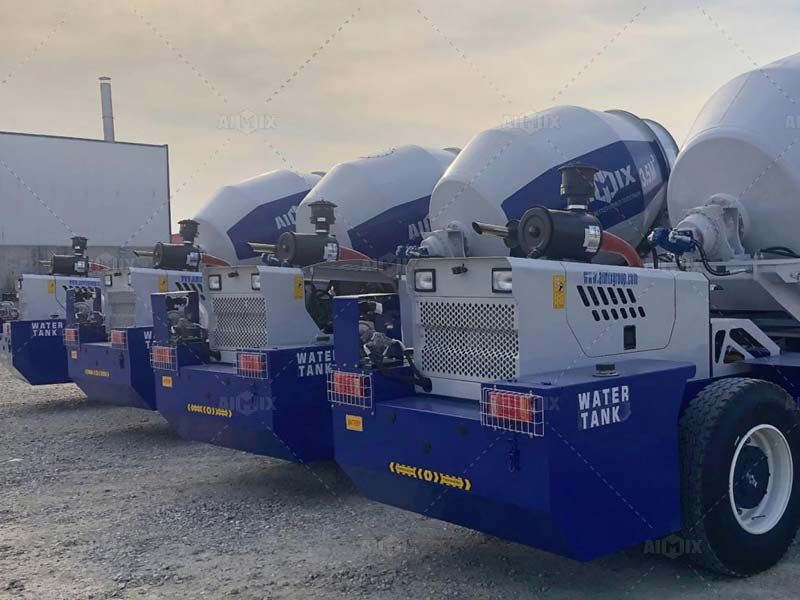What is the Difference Between a Transit Mixer and a Concrete Mixer?
- By AIMIX Group
- •
- 07 Apr, 2024
- •
Transit mixers and concrete mixers are integral components in the construction industry, each serving a distinct purpose in the concrete mixing and transportation process. Understanding the differences between these two types of mixers is essential for selecting the most suitable equipment for specific construction projects. Let's explore the characteristics of transit mixers and concrete mixers to discern their unique functionalities and advantages.
Characteristics of Transit Mixers
Design and Functionality
Transit mixers, also known as truck mixers or agitator trucks, are specially designed vehicles equipped with rotating drums for transporting and mixing concrete on-site. These mixers feature a cylindrical drum mounted on the truck chassis, which rotates during transit to prevent concrete segregation and maintain its uniform consistency. The drum is equipped with blades or fins that facilitate the mixing process as the vehicle moves to the construction site.
Applications and Advantages
Transit mixers are primarily used for transporting freshly mixed concrete from the batching plant to the construction site. Their ability to mix concrete en route ensures that the material remains workable and homogeneous upon arrival, minimizing the need for additional mixing on-site. Self loading transit mixer is commonly employed in large-scale construction projects, such as highways, bridges, and high-rise buildings, where a continuous supply of concrete is required. Their mobility and versatility make them indispensable for delivering concrete to remote or inaccessible locations, thereby enhancing construction efficiency and productivity.
Characteristics of Concrete Mixers
Design and Functionality
Concrete mixers, also known as batch mixers or stationary mixers, are stationary devices used for mixing concrete in a controlled environment. Unlike transit mixers, which are mounted on trucks for mobility, concrete mixers consist of a stationary drum or container equipped with rotating blades or paddles. These mixers are typically found at portable batching plants or construction sites where large volumes of concrete are produced and used.
Applications and Advantages
Concrete mixers are ideal for batch mixing applications where precise control over the mixing process is essential. They are commonly used in precast concrete production, where specific formulations and batch sizes are required to meet project specifications. Concrete mixers offer advantages such as consistency, repeatability, and flexibility in adjusting mix designs to accommodate varying project requirements. Additionally, their stationary nature allows for efficient operation and maintenance, contributing to long-term reliability and performance.
In conclusion, transit mixers and concrete mixers serve distinct yet complementary roles in the concrete production and transportation process. While transit mixers excel in delivering freshly mixed concrete to construction sites with mobility and efficiency, concrete mixers offer precise control and consistency in batch mixing applications. By understanding the unique characteristics and advantages of each type of mixer, construction professionals can make informed decisions to optimize concrete production and quality in their projects. View more info about mixers here: https://concretemixerwithpump.com/self-loading-concrete-mixer-with-pump/.
AIMIX Global Products
- Stone Crusher
- rock crusher
- Limestone Crusher
- granite crusher
- quartz crusher
- quarry crusher
- Gravel Crusher
- mobile crusher plant
- stone crusher plant
- crushing plant
- mobile impact crusher
- mobile jaw crusher
- mobile crusher
- mobile cone crusher
- mini self loading concrete mixer
- self loading mobile concrete mixture
- self loading concrete mixer for sale
- self loading concrete mixer truck
- self loading cement mixer
- asphalt plant for sale
- asphalt mobile plant
- drum mix plant
- mini asphalt plants for sale
- portable asphalt mixing plant
- asphalt hot mix plant
- batching plant manufacturers
- concrete plant for sale
- small concrete batch plant
- mini cement plant
- mobile concrete plant
- portable batch plant
- stationary concrete batching plant
- ready mix concrete plant
- how does a batching plant work
- concrete batching plant price
- ready mix concrete plant in bangladesh
- concrete batching plant in uae
- concrete batching plant indonesia
- concrete batching plant malaysia
- concrete batching plant for sale australia
- concrete batching plant Philippines
- concrete batching plant for sale UK
- concrete batching plant in saudi arabia
- concrete pump
- concrete mixer with pump
- mobile concrete pump
- portable concrete pump
- concrete trailer pump
- mini concrete pump
- small concrete pumps
- diesel concrete pump
- electric concrete pump
- hydraulic concrete pump
- dry mix mortar plant
- small dry mortar plant
- automatic dry mortar plant equipment
- big dry mortar plant
- dry mortar production line manufacturer
- dry mortar production line
- Tile adhesive manufacturing plant

